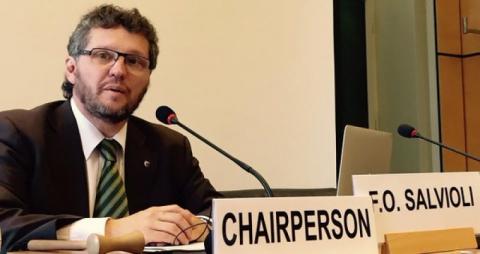
Since 2011, Morocco has undertaken a series of institutional reforms affirming the protection of human rights. The 2011 Constitution embodies several rights and fundamental freedoms, and provides that secret detention is a crime of the utmost gravity. Despite these notable legislative reforms, the Moroccan authorities must do more to assure that certain provisions of the International Covenant on Civil and Political Rights (ICCPR), ratified by Morocco in 1979, are fully implemented. The fight against terrorism is too often a pretext for the authorities to suspend or restrict the fundamental rights expressed in the Covenant in an abusive manner, despite their absolute nature.
On 16 December 2015, Alkarama submitted a list of questions to the United Nations Human Rights Committee (HRC) − a body responsible for monitoring the implementation of the ICCPR − in view of the consideration of Morocco's sixth periodic report. The State party is in fact required to submit periodic reports to the HRC on the implementation of the rights enshrined in the ICCPR. Morocco submitted its last report on 15 June 2015 with a seven-year delay. Alkarama took notice of the document and wished to contribute to the review process by submitting questions to the HRC focusing primarily on the fight against torture and arbitrary detention. Alkarama hopes that a constructive dialogue will be established between the UN HRC and Morocco concerning these prominent issues.
State security cannot justify the use of torture
Torture is still a major problem in the country. Even if this practice tends to decrease, it is still well- established, especially in cases involving State security. As recalled by the UN Special Rapporteur on torture (SRT) and Working Group on Arbitrary Detention (WGAD) after their respective visits to the country in 2012 and 2013, torture and ill-treatment are still practiced on a high scale on individuals suspected of terrorism. Alkarama regrets that Morocco's report does not provide sufficient credit to these allegations. Investigations into cases of torture are rare, and medical examinations provided for in the Code of Criminal Procedure are almost nonexistent. The report mentions only two convictions of police officers responsible for such acts dating back to 2007. The judicial system still seems to protect the torturers at the expense of the victims. Furthermore, Alkarama did not fail to recall that torture victims are liable to prosecution for "false accusations" or "malicious allegation" when filing complaints against Moroccan officials.
Unfair trials and arbitrary detentions
Although the Moroccan Code of Criminal Procedure declares invalid any statement obtained under coercion, confessions obtained under torture and in the absence of a lawyer are often used as evidence in the courts. In 2013, the WGAD found that "the anti-terrorist law adopted following the 2003 Casablanca bombings, that is still in force, is the legal framework of numerous human rights violations." The WGAD issued several opinions in 2013 about cases of arbitrary detention, such as on the case of Ali Aarrass, convicted on the sole basis of confessions extracted under torture. Held in secret detention Aarass was tortured before being charged with "participation in a terrorist network and arms trafficking." Sentenced on appeal on 1 October 2012 to 12 years in prison, he is currently serving his sentence in the Salé prison.
The Moroccan judicial system still relies excessively on confessions as a primary source for conviction. In its report, Morocco announced plans to reform the Code of Criminal Procedure. Alkarama hopes that this reform will strengthen the procedural safeguards necessary to hold a fair trial. It is also vital to amend or replace the 2003 Anti Terrorism Act to make the offences more precise, reduce the periods of police custody and establish a procedure to ensure fair trials.
For more information or an interview, please contact the media team to media@alkarama.org (Dir: +41 22 734 1008).
